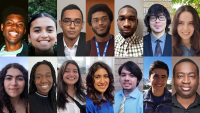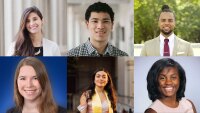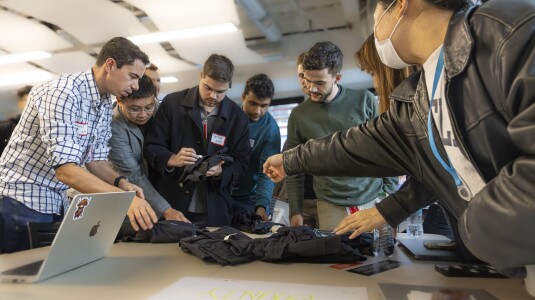Amazon recently announced seven new recipients of Amazon Fulfillment Technologies and Robotics Day One Fellowships. Established in 2021, the fellowship program supports emerging leaders from backgrounds underrepresented in STEM fields, offering scholarships, mentorship, and career opportunities to master's-degree students in robotics, engineering, computer science, and related disciplines.
The fellows have diverse technical and cultural backgrounds and come from partner universities including Harvard University, the Massachusetts Institute of Technology, Brown University, Stanford University, Boston University, Northeastern University, and Worcester Polytechnic Institute.
The Day One Fellowship covers tuition, living expenses, and other costs related to the recipients' studies, allowing fellows to graduate debt free. The fellows also have the opportunity to participate in Amazon Robotics’ internship program. During their summer at Amazon Robotics, the fellows connect with and receive mentorship from industry experts and Amazon leaders to gain hands-on experience in their chosen fields. Fellows seeking full-time industry positions also have the opportunity to join Amazon at the conclusion of their graduate studies.
Since its inception, the program has supported a total of 27 fellows. The success of the program is partially attributed to the positive experiences fellows have with their Amazon mentors and the strong sense of community fostered through engagements such as the annual Day One Fellowship Summit, which welcomes new fellows to the program.
Chris Croft (2021 cohort), a recent graduate of the Harvard John A. Paulson College of Engineering and Applied Science who now works as a data scientist at Amazon Robotics, shared his experience: “When I first started graduate school in 2021, mentors from the Day One Fellowship reached out to connect with me even before I arrived on campus. Since then, the support and opportunities they have provided have been instrumental in shaping both my academic and professional trajectory. From one-on-one mentorship with world-class experts to networking opportunities with fellow students and professionals interested in robotics and AI, the Day One Fellowship made it possible for me to find my role here at Amazon Robotics, where I'm able to work on cutting-edge challenges at the intersection of my personal, academic, and professional interests.”
The impact of the fellowship extends beyond Amazon Robotics. Graduates from the first two cohorts have pursued diverse paths in robotics-related fields. Some have taken on roles at various companies in the industry, while others have continued their academic journeys through doctoral studies.
Raechel Walker (2021 cohort), currently pursuing a PhD at the MIT Media Lab as a student in the Personal Robots Group, worked on a project addressing the lack of African Americans in computing fields. Her team's research, which won a best-position-paper award, introduced the concept of "liberatory computing." Liberatory computing combines traditional computing education with Aaliyah El-Amin's "liberation tools," aiming to equip African-American students with both technical skills and the ability to address societal racism. The goal is to increase diversity in tech fields while showing how computing can be used for social change.
Additionally, Priscilla Rubio (2022 cohort), who studied mechanical engineering as an undergraduate and recently completed a master’s of science in robotics and autonomous systems at Boston University, discovered her interest in multirobot systems during a summer internship with the Amazon Robotics Research and Development Engineering team. She says, “The Day One Fellowship made it possible for me to attend Boston University, which was previously financially out of reach. When I started the master’s program, I just wanted to build and tinker with robots, but I unexpectedly discovered a passion for research during my internship at Amazon Robotics. This experience, combined with the mentorship from my academic advisor, has motivated me to pursue a PhD in multirobot systems with the goal of becoming an applied scientist in the future.”
The Day One Fellowship program remains committed to fostering diverse leadership in robotics by investing in talented individuals from varied backgrounds, with the goal of increasing inclusivity in STEM and enabling great leaders to shape the future of robotics, not just at Amazon Robotics but across the industry as a whole.
The 2024 Amazon Robotics Day One Fellowship recipients are:
Sophia Jonas, Northeastern University: Jonas will pursue a master’s in robotics with a concentration in mechanical engineering at Northeastern University. She graduated in 2022 from the University of Illinois at Urbana Champaign, where she earned a degree in mechanical engineering with a minor in electrical engineering. After working as a motor engineer at Milwaukee Tool for two years, she is returning to graduate school to work toward her dream career in robotics. She would like to pursue work in human-robot interaction and augmentation (such as exoskeletons) or terrain-based search-and-rescue robots.
Sara V. Fernandez, MIT: Fernandez is currently pursuing a master’s at the MIT Media Lab in the Conformable Decoders group, where she focuses on market-informed medical-device development. Fernandez earned an MMSc. in global affairs as a Schwarzman Scholar at Tsinghua University and holds a BSc. in materials science and engineering from MIT, with minors in entrepreneurship and innovation and Chinese. At MIT, she engaged in international student outreach, mentorship, DEI initiatives, and varsity tennis. As a researcher in Conformable Decoders, she designed innovative medical technologies, yielding high-impact publications. Long-term, Fernandez seeks to apply her research to increasing healthcare accessibility in Latin America.
Patrick Ortiz, Brown University: Ortiz is currently pursuing a master's in computer science with an emphasis on machine learning and artificial intelligence. He earned his bachelor's in computer science, and his interests lie at the intersection of embedded systems and machine learning, particularly in developing compact, effective models for resource-constrained environments. He dreams of applying this technology to wearable devices and video game handhelds.
Deonna Owens, Stanford University: Owens is currently pursuing a master's in computer science at Stanford University. She earned her bachelor of science in computer science at Oklahoma's only HBCU, Langston University. Through her entrepreneurial venture, Opulink, which aims to bridge the wealth gap for Black Americans using AI, she has demonstrated a commitment to leveraging technology for social good. She is deeply passionate about AI ethics, focusing on creating transparent, unbiased, and fair AI systems. She aims to advance responsible innovation in robotics and AI, advocating for diversity, equity, and inclusion to ensure these technologies benefit society as a whole.
Dylan MacAllaster, Worcester Polytechnic Institute: MacAllaster is currently pursuing a master’s in robotics engineering at Worcester Polytechnic Institute (WPI), following their bachelor of science from Florida Polytechnic University in computer engineering with a concentration in autonomous robotic systems and a certificate in applied mathematics. They previously worked with large-scale robotic-manipulator-based additive-manufacturing systems and are currently developing software to automate and simplify data collection and processing procedures for photogrammetry drone surveys with the geospatial mapping company Overhead Intelligence. MacAllaster’s research interests lie in the localization and control of autonomous mobile robots, with a focus on leveraging software and mathematics to develop algorithms for safe, smooth, and precise motion of robotic systems in real time.
Shekinah Newson, Boston University: Newson will pursue a master's in robotics and autonomous systems at Boston University. During her post-baccalaureate studies at Harvard University, Shekinah gained practical experience in two research labs. Her projects included characterizing elbow and shoulder exosuit components for repetitive-motion scenarios, developing a soft robotic fish for STEM education, and creating a noninvasive method for measuring range-of-motion deterioration in children with neurological diseases at Boston Children's Hospital. Looking forward, her plans include conducting research in robotics and autonomous systems, with a focus on developing innovative assistive devices.
Xenia Dela Cueva, Harvard University: Cueva will pursue a master’s in computational science and engineering at Harvard University. She is a recent graduate from Dartmouth College, where she double-majored in computer science and geography. Xenia's passion lies in robotics, which she has explored through research at Dartmouth's Reality and Robotics Lab. Her research involved projecting mechanical sonar readings onto images to enhance depth estimation for autonomous underwater vehicles and remotely operated vehicles. Drawing on her background in geography and her passion for sharing technology, she hopes to continue working in robotics to create socially important applications like improving communities’ climate change resilience.










